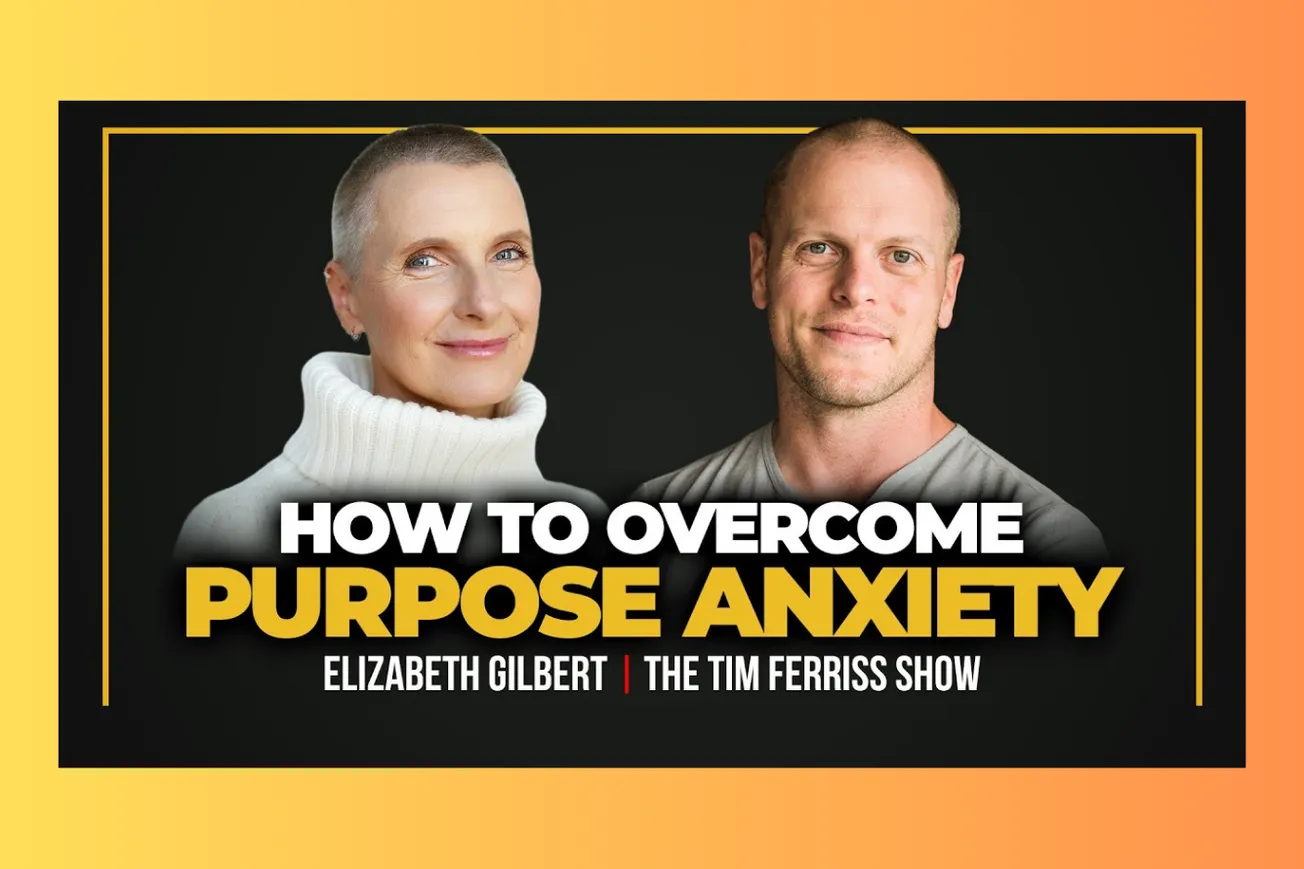Table of Contents
From "no cherished outcomes" to combating purpose anxiety, the bestselling author reveals how to build a relaxed, authentic life through mysticism, priorities, and self-friendliness.
Key Takeaways
- Adopting "no cherished outcomes" transforms relationships by removing hidden expectations that create resentment and disappointment.
- Writing daily letters from unconditional love provides a powerful antidote to the self-hatred that plagues high achievers.
- Purpose anxiety stems from capitalistic pressure to find your unique calling and change the world—presence offers a healthier alternative.
- Setting fierce boundaries with difficult people protects your serenity and prevents the dysregulation that leads to destructive behaviors.
- The "relaxed woman" represents a revolutionary concept that challenges the cultural expectation for women to be perpetually angry and exhausted.
- Mysticism, boundaries, and clear priorities form the essential trinity for maintaining inner peace in a chaotic world.
- Two-way prayer involves asking one question and listening for answers, rather than constantly begging for help without receiving guidance.
- Self-friendliness starts with basic courtesy—treating yourself with the same kindness you'd show a stranger on the subway.
Embracing "No Cherished Outcomes" in Relationships
- Gilbert discovered this phrase in a Celtic poem of approach, meant to be spoken when meeting new people or entering new territories. The full verse includes "I will honor your Gods, I will drink from your well, I bring an undefended heart to our meeting place, I will not negotiate by withholding."
- The philosophy works better in friendships than romantic relationships because partnerships trigger hidden expectations. Gilbert noticed she holds romantic partners responsible for her mood swings while treating friends with more acceptance and understanding.
- Hidden cherished outcomes reveal themselves through disappointment—you discover you had secret expectations when something doesn't happen the way you wanted it to. This awareness allows you to examine whether you truly want to honor the principle or prefer to sulk.
- Five years of chosen singleness and celibacy taught Gilbert that mood cycles are internal weather systems unrelated to other people. "I haven't been with anybody in five years and I felt not right when I woke up this morning and there's no one to pin it on."
- The practice requires constant vigilance against the tendency to blame others for your internal state. Gilbert acknowledges she doesn't know where the line is between personal responsibility and self-compassion, but finds it easier to navigate alone.
- Jerry Colonna's question "How are you complicit in creating the conditions you say you don't want?" serves as a powerful tool for examining personal responsibility without falling into self-attack or blame.
The Revolutionary Practice of Self-Friendliness
- Self-love feels lofty and unattainable, but self-friendliness offers a practical starting point—simply extending the common courtesy you'd show a stranger on the subway to yourself instead of constant internal criticism.
- The Dalai Lama's first encounter with Westerners revealed his shock at the concept of self-hatred, which required extensive translation because it didn't exist in his worldview. He spent 15 minutes trying to understand who the "enemy" was in self-hatred.
- When the Dalai Lama grasped that an entire room of accomplished Americans shared this self-hatred problem, he was devastated and said it fundamentally changed his understanding of the human mind and became his mission in the Western world.
- Sharon Salzberg noted that Buddhism teaches letting go of preciousness, but Westerners must first discover their preciousness before they can release it—most people haven't even reached the point of recognizing their inherent worth.
- Internal Family Systems therapy teaches the difference between feeling "about yourself" versus "toward yourself"—the preposition change instantly creates empathy and a friendly observer perspective rather than a critical judge.
- The simple shift from "How do you feel about yourself?" to "How do you feel toward yourself?" physically changes your nervous system response and automatically generates compassion rather than self-improvement lists.
The practice extends beyond internal dialogue to concrete self-protection through boundaries that preserve the hard-won peace created through meditation, prayer, and intentional living.
Letters From Unconditional Love: A Daily Practice
- Gilbert's letter-writing practice began during her deepest depression at age 30, when her carefully planned suburban life collapsed. She received a clear instruction to "get up, get a notebook and write to yourself the words that you most wish somebody would say to you."
- The first letter contained revolutionary messages: "I've got you, I'm with you, I'm not going anywhere, I love you exactly the way you are, you can't fail at this, I don't need anything from you, you don't have to improve, you could end up living under a bridge spitting at people and I would love you just as much."
- This practice, known as two-way prayer in 12-step recovery, involves asking one question and listening for answers rather than constantly supplicating. "I spend so much time begging for help you're not actually listening—too busy saying Marco to hear the polo."
- Effective two-way prayer requires opening with something holy (poetry works better than scripture for Gilbert), asking one focused question, and receiving an answer that begins with an endearment like "my love," "little one," or "sweetheart."
- The biggest resistance comes from people who say it feels artificial or like they're just writing to themselves. Gilbert responds: "What if it is just you? What if all it is is just you writing to yourself from a kinder voice within you? Wouldn't that be worthy enough to be slightly life-changing?"
- Over 20 years of practice, this has prevented Gilbert from ever reaching the depths of that original depression because "this is the net that catches me routinely before I can get that low, and that voice doesn't change."
Strategic Boundaries for Protecting Inner Peace
- Gilbert identifies people she's "not skilled enough to be able to hold my serenity when I'm around them"—relationships that cause her to lose the hard-earned peace generated through daily spiritual practices and intentional living.
- Certain people trigger dysregulation that leads to destructive behaviors: wanting to drink, call numbers she shouldn't dial, start smoking and driving fast. She's learned it's "unkind to myself to put myself in those situations again and again."
- The stewardship model treats your well-being as something you're responsible for protecting rather than something you should sacrifice for social obligations or family expectations. This includes the radical position that no one is entitled to be in your life regardless of biological relationship.
- Rachel Cargle's approach exemplifies extreme boundaries: "I cannot come up with a single name of anybody who is entitled to be in my life no matter what their biological relationship is to me." She's blocked family members for years when they proved too destructive.
- Communication strategies vary from honest conversations ("I notice I become so dysregulated after these encounters that I can't do this anymore") to complete withdrawal when attempts at dialogue would likely create worse problems.
- Holiday boundaries protect against cherished outcomes and performance pressure. Gilbert visits family any day except holidays, preferring one-on-one time over stressful group gatherings where everyone feels tense about meeting expectations.
Purpose Anxiety Versus Presence-Driven Living
- Purpose anxiety stems from the overwhelming cultural message that each person has one unique offering only they can deliver, must discover it young, master it completely, monetize it successfully, create opportunities for others, and leave a world-changing legacy.
- This theology mirrors capitalism's "never enough" mentality—there's no way to know you've achieved sufficient purpose, leading even highly successful people to suffer from scarcity anxiety about their impact and legacy.
- The ladder-holding story illustrates presence-driven purpose: Gilbert spent 45 minutes holding a stranger's ladder in Venice Beach, never speaking to him, but potentially fulfilling her entire life's purpose in that moment of anonymous service.
- "What if that was the entire purpose of my life, just that moment?" challenges the grandiose expectations of purpose-driven culture. Maybe everything else was "just killing time until the moment when I was needed."
- The "you'll be notified" approach requires deep listening and availability rather than forging predetermined paths. Gilbert takes Thursdays off from her phone to create space for noticing what's actually happening around her.
- Purpose-driven living focuses entirely on future legacy while missing the present moment. A life of presence offers more richness and meaning than constantly analyzing whether you've made a big enough impact.
The Three Pillars of the Relaxed Woman
- Gilbert defines the "relaxed woman" as revolutionary because the typical descriptors for admired women—badass, fierce, tough, resilient, brave, strong—have always been survival requirements rather than revolutionary concepts.
- Women receive cultural messages that it would be irresponsible not to be angry and tired given the world's problems, personal violations, and endless demands on their energy and attention.
- The three essential pillars for maintaining inner relaxation are boundaries (protecting your energy), priorities (having the courage to say "I don't care" about non-essential demands), and mysticism (connecting to perspectives beyond material reality).
- Boundaries protect the space needed for mystical practice, while clear priorities prevent the exhaustion that comes from trying to care about everything and everyone equally. Women aren't taught they're allowed to have priorities.
- Mysticism provides the only reliable way to relax the nervous system through deep meditation, two-way prayer, and connection to larger perspectives that reduce the stakes of daily concerns.
- The mystical component includes hearing "you don't even know what you're looking at" which pierces certainty and anxiety by acknowledging that reality might not be what it appears, making the virtual reality game less intense.
Elizabeth Gilbert's radical approach to boundaries and inner voice work offers a practical framework for escaping the exhaustion and anxiety that plague modern life. Her integration of mysticism, strategic boundaries, and self-friendliness creates space for presence over performance, connection over cherished outcomes, and inner peace over external validation. The relaxed woman she envisions isn't disengaged from the world—she's more effective within it because she operates from a place of genuine serenity rather than frantic obligation.





